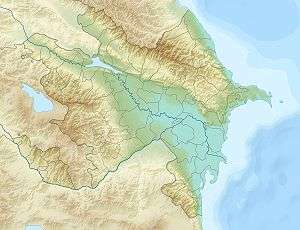Shamakhi Astrophysical Observatory
Coordinates: 40°46′20″N 48°35′04″E / 40.77222°N 48.58444°E
 Panoramic view of the Shamakhi Astrophysical Observatory | |
| Named after |
Nasir al-Din al-Tusi |
|---|---|
| Organization | National Academy of Sciences of Azerbaijan |
| Location |
Pirqulu, Azerbaijan |
| Coordinates | 40°46′20″N 48°35′04″E / 40.7722°N 48.5844°ECoordinates: 40°46′20″N 48°35′04″E / 40.7722°N 48.5844°E |
| Altitude |
1,500, 1,435 m (4,921, 4,708 ft) |
| Website | http://www.shao.az/ |
| Telescopes |
2 m Carl Zeiss Jena reflector AZT-8 photoelectric telescope AST-452 meniscus telescope Zeiss-600 telescope |
 Location of Nasir al-Din al-Tusi
Shamakhi Astrophysical Observatory Azerbaijan National Academy of Sciences Circular of the Shamakhy Astrophysical Observatory | |
|
| |
The Nasir al-Din al-Tusi Shamakhi Astrophysical Observatory (Azerbaijani: Nəsirəddin Tusi adına Şamaxı Astrofizika Rəsədxanası) is an observatory located in Shamakhi, Azerbaijan, on the south-eastern foothills of the Great Caucasus Mountain ridge, on the basis of Astrophysics branch of Physics Institution of the National Academy of Sciences of Azerbaijan, about 22 km far from the centre of Shamakhi and 144 km far from Baku, at an altitude of 1,435 m.
History
Construction of the observatory began in 1958 in then Azerbaijan SSR and officially opened on January 13, 1960.[1] Yusif Mammadaliyev – eminent Azerbaijani scientist – played a great role in foundation of the observatory.
During the Soviet period, the observatory measured the light polarization of Comet d'Arrest.[2]
In 1991, the observatory was given a name of Nasiraddin Tusi – mathematician, physicist and astronomer of medieval ages. A township for habitation of workers was established under the observatory and it was named after Yusif Mammadaliyev (Pirgulu).
In September 2008, the observatory went through capital repair, as a result, the exhibition hall, museum, conference and lecture halls, six buildings for telescopes, including the building housing the main two-metre telescope, and main administrative building have been overhauled and a canteen and cottages built.[3][4][5]
Telescopes

The main instrument – reflecting telescope produced in Germany, with diameter of mirror of 2 meters and which was turned over for operation in 1966 and which is the first big telescope of the South Caucasus. Besides that, the following instruments are also used in the observatory:
- Horizontal solar horoscope with a diameter of the main mirror of 50 cm, for spectral investigations of solar atmosphere;
- A chromospheric and photospheric AFR-2 telescope with dimensions of 20/13 cm, used for needs in solar service;
- AZT-8 reflector with diameter of a mirror of 70 cm;
- Reflector by Carl Zeiss company, with diameter of a mirror of 60 cm;
- Meniscus telescope of Maksutov’s system, equipped with a lens prism, with the diameter of inlet port of 35 cm.
In 2013, a 90-cm AZT-15 Schmidt Telescope is installed to the observatory.[3]
International collaboration and achievements
The Shamakhi observatory has made a significant contribution to extensive Soviet and post-Soviet scientific programmes in astrophysics and fundamental astronomy.[3] The observatory works on three main scientific trends: the physics of stars, investigation of solar system bodies and solar physics and solar-terrestrial relations.[3] Current investigations also include the effects of space weather, the history of astronomy, theoretical astrophysics, cosmology, helioseismology, radio-astronomy, practical astronomy, celestial mechanics, galaxies and the dynamics of artificial satellites.[3] In recent years, a new area of work has been the development and construction of astronomical devices such as Echelle spectrographs, used for investigations of celestial bodies.[3]
Holidays
The observatory is best known to the Azerbaijani public for its specifications of the exact time of holidays, such as the traditional new year, Novruz.[3] The observatory tells the media the moment of the vernal equinox, the time when the Sun will cross the equator, which marks the start of the new year.[3]
Directors of the observatory
| Name | Nationality | Period | Notes |
|---|---|---|---|
| Hajibey Sultanov | 1951-1980 | [6] | |
| Ogtay Huseynov | 1980-19?? | [7] | |
| Alik Abbasov | 19??-???? | [7] | |
| Zohrab Ismayilov | 19??-???? | [7] | |
| Kamran Huseynov | 19??-???? | [7] | |
| Schmidt Ahmadov | ????-1997 | [7] | |
| Ayyub Guliyev | 1997–present | [8] | |
Famous workers of the observatory
| Wikimedia Commons has media related to Shamakhi Astrophysical Observatory. |
References
- ↑ "Brief History". Shamakhi Astrophysical Observatory. Archived from the original on 2008-05-25. Retrieved 2008-01-10.
- ↑ Бронштэн, В.А. Появления комет в 1976 г (in Russian). Астрономический календарь 1978 г. Archived from the original on 2006-01-17. Retrieved 2007-06-06.
- 1 2 3 4 5 6 7 8 Babayev, Elchin. "Azerbaijan's Window on the Universe". www.visions.az. Retrieved 15 November 2014.
- ↑ "Azərbaycan Prezidenti Şamaxı Astrofizika Rəsədxanasında olub". anspress.com.
- ↑ "İlham Əliyev Şamaxı Astrofizika Rəsədxanasında aparılan yenidənqurma işləri ilə tanış olmuşdur". president.az.
- ↑ Султанов, Гаджибек Фараджуллаевич. dic.academic.ru (in Russian). Retrieved 15 November 2014.
- 1 2 3 4 5 Шемахинская астрофизическая обсерватория. www.orengosta.ru (in Russian). Archived from the original on 15 November 2014. Retrieved 15 November 2014.
- ↑ "Nəsirəddin Tusi adına Şamaxı Astrofizika Rəsədxanası". AMEA İnformasiya Texnologiyaları İnstitutu. Archived from the original on 2012-05-24.